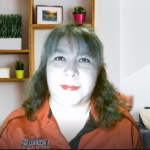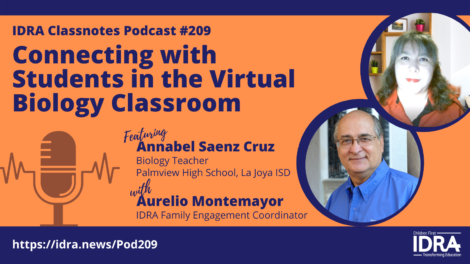
Connecting with Students in the Virtual Biology Classroom – Podcast Episode 209 | Classnotes Podcast 209
Podcast: Play in new window | Download
 Classnotes Podcast (April 6, 2021). At the core of IDRA’s philosophy is the recognition that each student is a unique and whole human being and should be treated as such. Our guest for this episode is Annabel Saenz Cruz who teaches ninth-grade biology at Palmview High School in La Joya ISD.
Classnotes Podcast (April 6, 2021). At the core of IDRA’s philosophy is the recognition that each student is a unique and whole human being and should be treated as such. Our guest for this episode is Annabel Saenz Cruz who teaches ninth-grade biology at Palmview High School in La Joya ISD.
She joins Classnotes to discuss the most valuable tool in keeping students engaged in participation and learning: establishing personal connection with them as unique human beings. She also discusses practical strategies in teaching difficult concepts through virtual learning, especially with English learners, as well as the necessity of technological literacy. Annabel was interviewed by Aurelio Montemayor, M.Ed., Family Engagement Coordinator.
Send comments to podcast@idra.org.
Sign up to receive free e-mail notices when new episodes are available.
Show length: 28:33 min.
Resources
Teachers Share Best Practices for Virtual Instruction in the Age of COVID-19, IDRA Newsletter
Chief Science Officer Teens Get Creative to Promote STEM While Navigating School Closure, IDRA Learning Goes On
Science Comes Alive By Generating Interest and Promoting Inquiry-Based Learning, IDRA Learning Goes On
Teaching Science in Virtual Learning Environments, IDRA Webinar
Chief Science Officer Students Determined to Promote STEM Despite School Closures, n IDRA Webinar
Student Perspectives on a Changing School Climate, IDRA webinar
Equitable Practices for Teaching Online, IDRA webinar
Your feedback
We welcome your comments and questions to the podcast. Send an e-mail to podcast@idra.org.
Listen to every episode!
To ensure you don’t miss a single episode of IDRA Classnotes, subscribe to the podcast in iTunes, (download iTunes free if you don’t have it) or sign up to receive an e-mail alert as soon as a new show is published.



